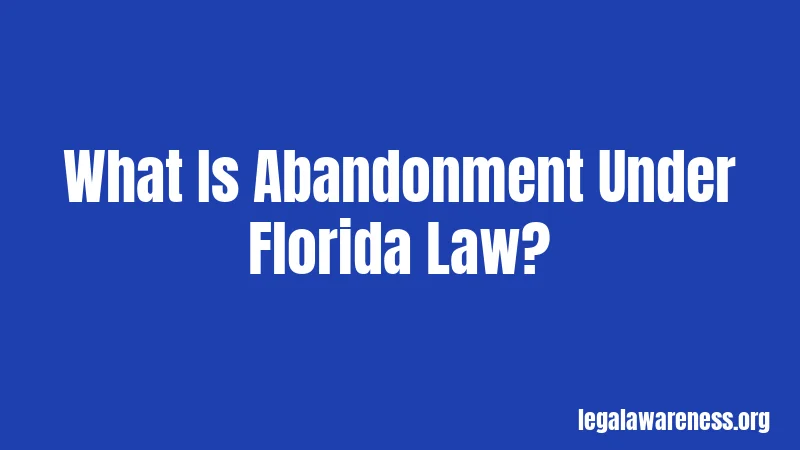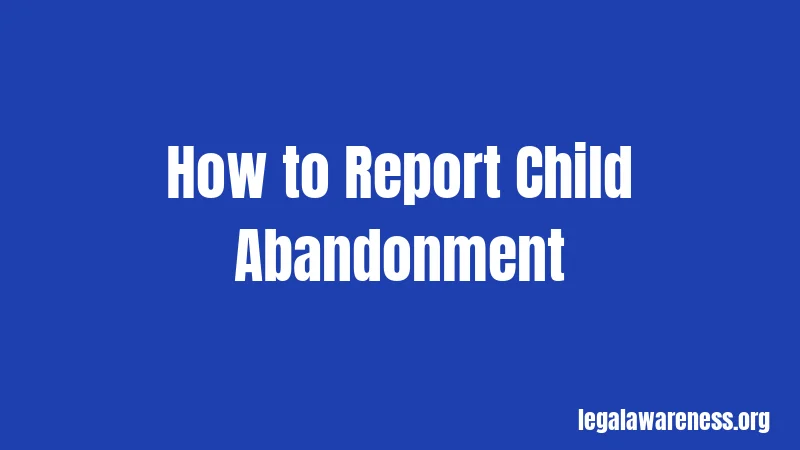Abandonment Laws in Florida (2026): Breakdown for Every Situation
Most people don’t realize Florida has multiple abandonment laws. Seriously. There’s not just one “abandonment” rule in Florida. There are several different types, and they cover everything from children to spouses to rental properties.
Here’s the deal. Whether you’re a parent, a landlord, or someone going through a tough marriage, understanding these laws can protect you from serious consequences. Let’s break it all down so you know exactly where you stand.
What Is Abandonment Under Florida Law?

Abandonment in Florida means different things depending on the situation. The basic idea is simple. Someone leaves behind a person, property, or responsibility without proper care or notice.
But the details matter a lot. Florida law treats child abandonment very differently from spousal abandonment. And property abandonment has its own set of rules entirely.
Sound complicated? It’s actually not once you understand the categories. Let me walk you through each one.
Child Abandonment Laws
Okay, pause. This one’s important.
Florida takes child abandonment extremely seriously. Under Florida Statute 39.01, abandonment happens when a parent or caregiver fails to provide care, support, or maintain a meaningful relationship with their child.
Here’s what the law specifically looks at. Did the parent make significant contributions to the child’s care? Did they try to stay involved through visits or communication? Token efforts and occasional contact don’t count. The state wants to see real, ongoing involvement.
What Counts as Child Abandonment?
The law considers several factors when determining abandonment. A parent who can provide support but chooses not to may be found guilty. The same goes for parents who fail to visit, communicate, or show interest in their child’s life.
Incarceration alone doesn’t automatically equal abandonment. However, repeated or extended jail time can support a finding of abandonment. Military deployment is treated differently. The law specifically says that a parent’s absence due to military service cannot be used against them.
Wondering what “significant contribution” means? It includes financial support for basic needs. It also means being present emotionally and physically in the child’s life. Random birthday cards or sporadic phone calls won’t cut it.
Criminal Penalties for Child Desertion
Here’s where it gets serious. Florida Statute 827.10 covers unlawful desertion of a child. This law makes it a crime for any caregiver to desert a child under dangerous circumstances.
The official definition is pretty straightforward. Desertion means leaving a child somewhere with the intent not to return and not to provide for the child’s care. If the caregiver knew or should have known the situation puts the child at risk, they’ve committed a crime.
This is a third-degree felony in Florida. That means you could face up to 5 years in prison. Fines can reach $5,000. You might also lose your parental rights permanently.
But wait, there’s more. If the child suffers great bodily harm because of neglect, the charges get worse. That bumps it up to a second-degree felony. Now you’re looking at up to 15 years in prison.
The Safe Haven Exception
Not sure what counts as abandonment for newborns? Florida has a Safe Haven law that provides a legal way for parents to surrender babies.
Under Florida Statute 383.50, parents can leave an infant at a hospital, fire station, or emergency medical services station. The child must be approximately 7 days old or younger. Staff at these locations will provide immediate care and arrange placement.
Here’s the key part. Parents who use the Safe Haven option are immune from prosecution. The law specifically says surrendering a baby through proper channels is not considered abandonment. No questions asked. Complete anonymity is protected.
Florida even has baby boxes at some fire stations. These are secure devices where parents can safely surrender infants 24 hours a day, 7 days a week.
Parents can change their minds and reclaim their baby. But they must act before the court terminates their parental rights. Once that judgment is entered, it’s final.
Spousal Abandonment Laws

This part confuses a lot of people. Here’s the truth.
Florida is a no-fault divorce state. That means you don’t need to prove abandonment or any other wrongdoing to get divorced. You just need to show the marriage is “irretrievably broken.”
So what role does abandonment actually play? It can affect related issues like alimony, property division, and child custody. But it won’t be the reason a court grants your divorce.
Criminal Desertion of Family
Florida Statute 856.04 does make family desertion a crime. Under this law, anyone who deserts their spouse or children and willfully withholds financial support can face charges.
This is a third-degree felony. The penalties include up to 5 years in prison and fines up to $5,000.
However, there’s an important exception. No one will be prosecuted if grounds for divorce exist when the desertion happens. Since Florida only requires showing the marriage is broken, this exception applies in most cases.
Pretty much, the criminal law exists but rarely results in prosecution. The desertion itself can actually serve as proof that the marriage is over.
How Abandonment Affects Divorce
Even though abandonment isn’t grounds for divorce, it still matters. Courts consider a spouse’s behavior when making decisions about money and children.
For alimony, a spouse who abandoned the family and caused financial hardship may strengthen the other spouse’s case for support. If you were left paying all the bills while your spouse contributed nothing, that matters.
Child custody decisions focus on the child’s best interests. A parent who walked away from the family may be seen as unable or unwilling to meet the child’s needs. This can result in limited custody or supervised visitation.
Property division follows equitable distribution rules. If one spouse abandoned the marriage and made no contributions to assets during their absence, the court may award a larger share to the other spouse.
Types of Spousal Abandonment
Florida recognizes different forms of abandonment. Understanding these helps clarify your situation.
Actual abandonment is physical. One spouse leaves the home and never intends to return. They may cut off all contact and stop providing support.
Constructive abandonment is emotional or behavioral. The spouse might still live in the home but refuses to fulfill marital responsibilities. This could include withholding intimacy, refusing to contribute financially, or making life unbearable through abuse.
Criminal abandonment is the most severe. This happens when someone stops caring for a dependent spouse. You can’t simply walk away from a sick partner who relies on you for care.
What to Do If Your Spouse Abandons You
First, document everything. Save text messages, record dates of events, and keep financial records showing what happened.
Consult a family law attorney as soon as possible. They can help you understand your rights and file for divorce. You don’t need your spouse’s cooperation to proceed.
If children are involved, you can request temporary custody and child support orders. The court can issue these while the divorce is pending.
Don’t forget about financial protection. You may need to close joint accounts or protect assets from being drained.
Rental Property Abandonment Laws
Now let’s talk about what happens when a tenant walks away from a lease.
Florida Statute 83.595 spells out the rules for landlords dealing with abandoned rental properties. This matters whether you’re a landlord trying to regain possession or a tenant who needs to leave unexpectedly.
When Is a Property Considered Abandoned?
Florida law allows landlords to presume abandonment under specific conditions. The tenant must be absent for at least 15 consecutive days. Rent payments must not be current. And the tenant must not have provided written notice of an extended absence.
Here’s an important detail. Tenants are required to notify landlords if they plan to be away for more than 7 consecutive days. This requirement is usually written into the lease agreement.
If the tenant notified the landlord in writing or kept rent payments current, the landlord cannot claim abandonment. Clear communication prevents confusion on both sides.
Landlord Options After Abandonment
Once abandonment is established, landlords have several choices under the law.
Option one is to terminate the lease completely. The landlord takes back the property and releases the tenant from future liability. This means giving up any claim to remaining rent owed under the lease.
Option two is to retake possession and try to find a new tenant. The landlord can hold the original tenant liable for any difference between the old rent and what the new tenant pays. But the landlord must make a good-faith effort to find a replacement.
Option three is to do nothing and hold the tenant responsible. The landlord can keep the tenant on the hook for rent as it comes due under the original lease terms.
Handling Abandoned Personal Property
What about stuff left behind? Florida law addresses this too.
Landlords cannot just throw away a tenant’s belongings. They must give proper notice and store items for a reasonable time. Only after following these steps can property be sold, donated, or discarded.
Florida Statute 83.675 allows landlords to include a clause in leases stating they won’t be responsible for abandoned property. This clause must appear in bold and underlined text to be enforceable.
Tenant Rights and Responsibilities
Tenants who need to leave early should give written notice. The law requires at least 7 days’ notice before vacating or abandoning a property.
This notice must include your forwarding address. Failing to provide it may affect your ability to get your security deposit back.
If you abandon without notice, you may still owe rent for the remainder of your lease. However, Florida law limits this if the landlord finds a new tenant. You’re only responsible for the difference between what you owed and what the landlord collects.
Lost and Abandoned Property Laws

Florida also has rules about physical property that gets lost or abandoned on public land.
Under Florida Statute Chapter 705, law enforcement handles abandoned property found in public areas. They post notices and give owners time to claim items. After a 90-day waiting period, the finder can take ownership if proper procedures were followed.
The original owner remains responsible for storage and transportation costs. If they don’t pay within 30 days of making a claim, the law enforcement agency keeps the property.
Penalties Summary
Let me break down the consequences for different types of abandonment.
Child desertion carries the heaviest penalties. A third-degree felony means up to 5 years in prison and $5,000 in fines. If the child suffers serious harm, charges increase to a second-degree felony with up to 15 years in prison.
Family desertion is also a third-degree felony. However, it’s rarely prosecuted when divorce grounds exist.
Rental abandonment doesn’t carry criminal penalties. But tenants may owe remaining rent plus fees outlined in their lease. Landlords must follow proper legal procedures or face liability.
How to Report Child Abandonment

If you suspect a child has been abandoned, you need to report it. This isn’t optional. Florida law requires anyone who knows or suspects abuse, neglect, or abandonment to report it immediately.
Call the Florida Abuse Hotline at 1-800-962-2873. The hotline operates 24 hours a day, 7 days a week. You can also report online at the Department of Children and Families website if the situation isn’t an immediate emergency.
For emergencies where a child is in immediate danger, call 911 first. Then call the hotline to file a report.
Reports are confidential. Anyone who reports in good faith is protected from liability. The law shields reporters from civil or criminal consequences when they act with honest intentions.
Frequently Asked Questions
How long before someone is considered to have abandoned a child in Florida?
There’s no specific time limit. Courts look at the overall pattern of behavior. Did the parent contribute to the child’s care? Did they maintain contact? Marginal efforts over any period don’t satisfy parental obligations.
Can I get a divorce if my spouse abandons me?
Yes, but not because of the abandonment itself. Florida is a no-fault state. You only need to prove the marriage is broken beyond repair. Your spouse’s absence makes this easy to establish.
What happens if I abandon my rental property mid-lease?
You may owe remaining rent, early termination fees, and damages. Your landlord can keep your security deposit and pursue you for additional losses. Your credit score could also suffer.
Can I surrender a baby at any fire station in Florida?
Yes. All fire stations staffed with firefighters, EMTs, or paramedics must accept surrendered infants. Hospitals with emergency rooms also accept babies. Parents can remain anonymous.
How old can a baby be under the Safe Haven law?
The infant must be approximately 7 days old or younger. Medical staff will evaluate the baby’s age. Older babies do not qualify for Safe Haven protection.
Final Thoughts

Florida abandonment laws cover a lot of ground. Whether it involves children, spouses, or property, the rules exist to protect vulnerable people and clarify responsibilities.
The most serious consequences apply to child abandonment. Criminal charges, prison time, and loss of parental rights are all possible. If you’re struggling as a parent, reach out for help before it reaches that point.
For marriage and property situations, the stakes are different but still significant. Financial consequences and custody arrangements can follow you for years.
When in doubt, consult an attorney. They can explain how these laws apply to your specific situation and help you make informed decisions.
References
- Florida Statutes Chapter 39 – Proceedings Relating to Children: https://www.flsenate.gov/Laws/Statutes/2024/39.01
- Florida Statutes § 827.10 – Unlawful Desertion of a Child: https://www.flsenate.gov/Laws/Statutes/2024/Chapter827/All
- Florida Statutes § 383.50 – Safe Haven for Newborns: https://www.leg.state.fl.us/statutes/index.cfm?App_mode=Display_Statute&URL=0300-0399/0383/Sections/0383.50.html
- Florida Statutes § 83.595 – Tenant Abandonment Remedies: https://www.flsenate.gov/Laws/Statutes/2024/Chapter83/All
- Florida Abuse Hotline – Department of Children and Families: https://www.myflfamilies.com/services/abuse/abuse-hotline
